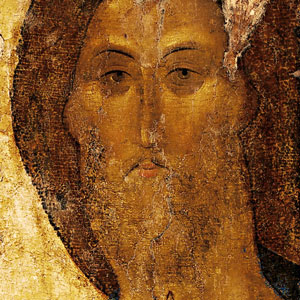Did Jesus believe He was God?

Detail from “The Saviour” by Andrei Rublev (ca. 1428). Tretyakov Gallery.
Q. Doesn’t John 17:3 demonstrate that only the Father is the true God? Isn’t it the church that deified Jesus and the Spirit?
A. The passage says, “This is eternal life, that they might know you, the only true God, and him whom you have sent, Jesus Christ.” This is near the beginning of what many call Jesus’ high-priestly prayer (John 17:1-26).
Note the entire context. Jesus claims to have shared glory with the Father since before the world was created (v. 5). He acknowledges possessing all that the Father has (v. 10) and notes his oneness with the Father (“I in you and you in me”), (vv. 21, 23). This is consistent with other statements in the Gospel of John that can only mean Jesus is deity (e.g., the “I am” statements: John 6:35; 8:12, 58; 10:7-9, 11, 14; 11:25; 14:6; 15:1, 5).
The conclusion that the Godhead has three persons is based on many passages, which affirm the deity of the Son and the Spirit just as clearly as the deity of the Father is affirmed elsewhere in Scripture. This idea that the church deified the Son and the Spirit, which is a misunderstanding of the Bible at best and a bald-faced perversion of it at worst.
The Gospel of John begins with “And the Word was God” and ends with Thomas’s confession addressed to Jesus, “My Lord and my God” (John 1:1; 20:28). Notice that Jesus does NOT say to Thomas, “Now wait a minute! You’ve got it all wrong. I am your Lord, but I am certainly not your God!” No, instead, he accepts his worship and then sends a blessing down through the centuries all the way to us, who believe even though we have not seen (John 20:29).
What we have to do rather than pitting one passage against many others is to work on how they fit together, how they reveal to us the mystery of the Godhead. Father, Son, and Spirit are all eternal, omniscient, omnipotent, love-filled, and infinitely holy. Yet the Bible affirms them as the One God with whom we have to deal. The Church did not make up the deity of Christ and the Spirit. We Christians believe it because Scripture tells us so.
How all of this fits in with John 17:3 appears to be this: Jesus is affirming that God is the only God there is. He can do this without disavowing his own deity, because the deity of Father, Son, and Spirit does NOT mean we have three Gods, but one.
The Son is so one with the Father that affirming the Father is the only true God does not negate the deity of the Son, or of the Spirit. The Godhead is three persons in one God. Yes, it is a profound mystery. Yes, it seems to be a logical and mathematical puzzle (how does 3=1?). But God is infinitely unfathomable, given the limits of our capacity to understand Him (see Isa. 55:8-9; Isa. 40:13-14).
Should we be surprised that God’s nature is hard to understand? Should we balk at the Bible’s claims that the Father is God, the Son is God, and the Spirit is God, yet the three are so unified that only one true God exists? Our humble place before the Creator should give us the capacity to grant that beyond the limits of our our logical rationality lies the mysterious. Scripture reveals to us that this realm of the mysterious is out there. Can we set aside human pride in our own intellect long enough to accept it?

